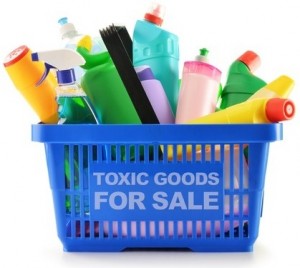Our endocrine system is responsible for the production & maintenance of our hormones. It consists of many organs, such as the pituitary, thryoid, adrenals just to name a few, and requires a delicate “feedback loop” to function properly and maintain homeostasis.
Many things can affect our hormone levels. Our hormones naturally fluctuate during specific times of our life (ie puberty). However, our lifestyle choices and environment do directly affect our hormones as well, and can alter that specific balance our bodies need.
Endocrine Disruptors are chemicals that alter hormones and their functions. Research has shown they produce adverse immune, neurological, reproductive and developmental effects in our body and also to the environment.
Endocrine Disruptors do many things depending on the chemical and the organ affected. 
It interferes with normal hormone production by lowering, raising or imitating hormones. These chemicals also can block or bind hormone receptor sites.
Endocrine Disruptors have been linked to:
- Early Onset Puberty
- Low Estrogen, Progesterone and/or Testosterone
- Estrogen Dominance
- PCOS
- Infertility in men and women
- Thyroid Irregularities such as Hypothyroidism
- Neurological issues such as ADD or MS
- Obesity
- Diabetes
- Cancers of the Reproductive System, such as Breast or Prostate
- Kidney and Lung Cancer
- Gut Dysbiosis and gut-related issues, as many of our hormones are produced & synthesized by our microbiome
The US spends over $300 BILLION dollars a YEAR on health-care costs related back to endocrine-disruptors. Yet, we aren’t any healthier and the root cause of these issues still exist!
So, where ARE these Endocrine Disruptors?
There are many, but here are some top chemicals to look out for:
- BPA: Bisphenol-A, a synthetic chemical found in all plastics, can linings, resins
- Atrazine: Found on conventional corn crops and in water supplies
- Glyphosate: Also known as “Roundup” weed killer, this toxin is used in conventional farming & has been found in produce, corn, soy, vegetable oils, and even packaged foods such as cereal.
- Phthalates: found in plastics, skin care, beauty, self-care products etc. Most commonly labeled as “fragrance”.
- Parabens: group of chemicals found commonly in skin care products (soaps, lotions, makeup, deodorants) makeup, etc.
- Perfluorinated Chemicals/PFCs: used in non-stick cookware & microwave popcorn bags
- Heavy Metals: Arsenic, Mercury and Lead have all been found in water supplies, food such as conventional seafood, silver fillings, and paint
- Anti-biotics and Hormones: Found in conventionally-raised meat supply (poultry, red meat, etc). They are given to the animals to increase their growth & decrease rate of illness due to non-ethical conditions of the farm.
We know this list can be overwhelming and it can seem daunting. However, there ARE many things you can take to avoid these chemicals to be proactive with your health.
So, where can you start?
- Be aware & take inventory. Look around your house…how many chemicals and toxins are YOU encountering every day? Being mindful is the first step. Most people have no idea how many toxins they are putting on and/or consuming even before they walk out the door in the morning.
- Start small. Don’t feel like you need to overhaul everything at once; it will only stress you out! Instead, focus on one “group” of products at a time. For instance, start in your bathroom. Swap out your skin products for ones with more natural ingredients. Then, move to your hair care. Once done in the bathroom, move to your cleaning supplies. Over time, you will have a chemical-free house!
- If you can’t make the switch immediately, finish what products you have now while researching what you will use instead. There are many great sites such as EWG.com for Consumer Education and references.
- Use apps, such as Think Dirty (thinkdirtyapp.com) to learn about the ingredients in your skin, beauty and/or cleaning products. It scans the barcode, ranks the product based on it’s amount of chemicals and then provides healthier options & brands.
- Be picky with your food. Choose organic, non-GMO certified and the highest quality foods whenever possible. Eating whole, unprocessed real foods will cut back on the consumption of the chemicals found in conventionally prepared food products.
Stay tuned for future posts on more specific ways to avoid Endocrine Disruptors and chemicals!
Interested in improving your health and how we can help? Give our office a call!
We offer a new patient special for $47 (a $325 value), which includes a full health history, consultation, complete health examination, all necessary X-rays and a report of findings.
*Offer excludes: workers’ comp, personal injury, Medicare and Medicaid. We do not participate with workers’ comp, Medicare, and Medicaid.
